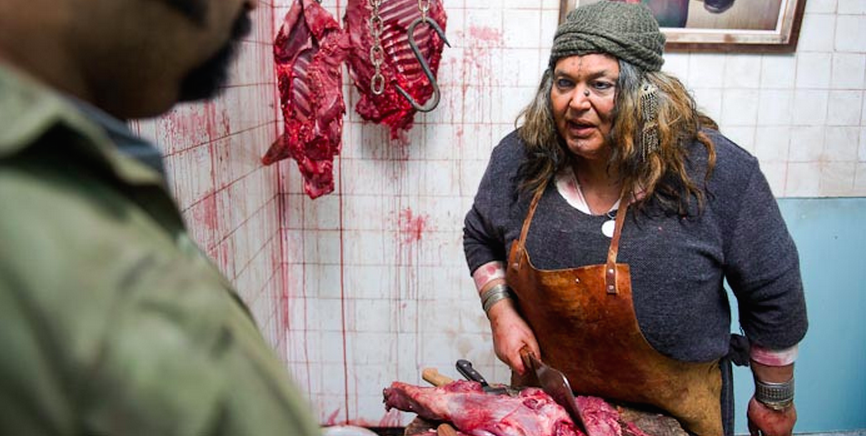Simian symbolism in the films of Hany Abu-Assad and Nejib Belkadhi
Do you know how they catch monkeys in Africa?
Well, apparently the story goes that hunters in sub-Saharan Africa get their prey addicted to sugar, after which they lay traps for them containing the saccharine bait. Later, when the monkeys thrust their grubby paws into the traps, they aren’t able to withdraw them, and are left helpless until they’re snatched away by their predators. On a similar note, I also recently learned about social dynamics among baboons, and the patriarchal nature of their clans. Quite simply, one male member asserts his authority by having the rest of the clan ‘subject’ themselves to him; from a practical standpoint, this is supposed to encourage unity and obedience among the clan, and prevent any unsavoury scuffles.
While ordinarily one gleans such substantial tidbits of knowledge from the barrage of nature programs on television, I was alternatively enlightened by two new films at this year’s edition of the Toronto International Film Festival. Omar by Palestinian director Hany Abu-Assad and Bastardo by Tunisian director Nejib Belkadhi are wildly different in terms of subject, style, story, and mood; however, there is something they share in common, and interestingly, it happens to their mutual use of references to our simian cousins in helping develop their plots. Though I was almost completely knackered by the end of Bastardo towards morning, in addition to having indulged in a nauseating combination of beer, followed by popcorn and ice cream for ‘dinner’ (Bastardo having screened immediately after Omar at 9 pm), the allusions to monkeys and baboons were too apparent not for me to notice.
‘I love Iran!’ were Hany’s first words upon meeting me at a private gathering before the premiere of his film. ‘And Iran loves Egypt!’ I said, after receiving two wet kisses on the cheek, at a serious loss for words. He looked at me blankly. ‘Joobin, Hany is from Palestine …’ came my friend’s correction, in an attempt to mitigate my faux pas. ‘Aha, yes! But your film is about Egypt!’ I had mistaken the man for the director of Rags and Tatters, an Egyptian documentary that also screened at the festival. Whether it was because of the wine, or simply due to his nonchalant, amiable attitude, we quickly carried on to discuss Iranian cinema (Amir Naderi being a favourite director of his), and of course, Omar, which would be premiering in half an hour or so.
Shot in Nablus and Hany’s birthplace of Nazareth (‘where Jesus was from’, explained Hany afterwards, in case anyone was wondering), Omar – the first Palestinian film to be almost entirely funded and made by Palestinians – revolves around the life of Omar, a young Palestinian man, and his friends Amjad and Tarek. After they decide to kill an Israeli soldier at an outpost – the deed being carried out by Amjad) – they flee, and become fugitives in apartheid Palestine. Owing to the cunning of the Israeli secret service, however, an ambush is laid in which Omar is arrested, and forced to serve as a collaborator.
While in the beginning, Omar largely goes by unnoticed among his friends and family, as time goes on and he is arrested and released for the second time, things start to smell – bad. As with Hany’s previous award-winning film, Paradise Now, the focus of Omar is the concept of the collaborator, and the chronic lose-lose situations that being a collaborator entails. In Paradise Now, while the protagonist was not a collaborator himself, his father was – a fact that shrouded his own life in shame, mystery, and doubt. In Omar, however, one experiences Palestine through the eyes of the ‘enemy within’. Stuck between a rock and a hard place, Omar slowly becomes alienated from those closest to him – his friends, his girlfriend, his relatives – until he finds he has no one to turn to but the Israelis themselves. In essence, Omar becomes the very sort of monkey he and his friends were joking about at the beginning of the film, though his plight is more tragic. What does one do when they are abandoned by the cause that defines their existence, the people of their land – everything they ever knew? It’s not just a matter of simply being captured and tortured, but rather of losing one’s raison d’etre. ‘The Israelis have said that collaborators are essential in winning a war’, Hany mentioned. ‘They don’t just destroy your houses … they destroy you from within’.
… Man is stripped down of any remaining artifices, and reduced to his most primal state; [the films] urge one to reflect not only on the almost primitive struggles of their characters, but also on the very essence of man and his condition
On the other hand is Nejib Belkadhi’s debut feature film, Bastardo. Set in present day Tunisia (though making no references to the ‘Arab Spring’ uprisings there, as Nejib himself emphasised), it tells the story of a small village of larger-than-life characters, and what happens between two rival gangs when mobile technology is introduced there. Though it took years to bring to fruition, Belkadhi apparently can’t stand the sight of it anymore, as he told me in between drags on an electronic cigarette. ‘It’s not my film anymore – it belongs to the audience’. At first, I thought it was just a case of nerves, although once the film commenced and he literally dashed out of the cinema … well, one could say I wasn’t exactly expecting that.
As a child, Mohsen is left for dead in a dumpster, until salvaged by a chef in a nearby restaurant. Nicknamed ‘Bastardo’, he grows up alongside the thug Larnoubi and his monster of a mother, Khadra, who, waving the banner of Larnoubi’s father, keep the entire village trembling under their thumbs. Similar to the case of Omar, one witnesses the comparison between the characters in the film with their simian counterparts very early on. Sitting watching television with a pudgy Larnoubi as a child, a program about baboons comes on, much to Mohsen’s disgust, though it elicits not a few laughs from Larnoubi and his mother. Without any reservations, the process of male subjugation is shown in full – a scene that will not only resurface in Mohsen’s mind throughout his life, but that will also serve as an illustration of the future predicament of the village.

A still from Bastardo
When a telecom company arrives in the village, it is determined that Mohsen’s ‘house’ represents the best possible location for a tower to be set in place. Seeing the financial possibilities such a venture can afford him, Mohsen agrees to the scheme – albeit not after being egged on by his friend Khalifa – and his days of glue sniffing and scrounging about soon come to an end. Though the villagers begin to enjoy the luxuries of mobile phones and Mohsen’s life is virtually turned upside down, at this stage one simply bears witness to the calm before the storm. Having little tolerance for seeing their power slowly subside, Larnoubi and his mother Khadra whip up a storm that soon engulfs the entire village in a civil gang war. Feeling not unlike Hany’s Omar, trapped beyond salvation, his situation is elucidated by the ghost of his friend Khalifa. ‘The flock needs a leader’, he says. ‘These people are monkeys, and they need someone to @$%&them, otherwise they’ll slaughter each other’. Here, Khalifa’s remarks not only apply to the circumstances faced by the village, but can also be seen as a telling critique of dictatorships. As much as Nejib stressed the fact that his film bears no references to the recent turmoil in the region (especially as production began before 2010), that’s not to say there aren’t any political references in it. In fact, one of the scenes in which Mohsen – by this time the ‘head’ of the village – coolly sits on a chair while people come to kiss his hand one by one was directly inspired by a similar scene Nejib witnessed involving the former Tunisian king, Zine El Abidine Ben Ali, in a bazaar.
Though Omar and Bastardo seemingly sit on opposite ends of a spectrum on most levels, their use of monkey metaphors is strikingly similar. In Omar, one sees a man at his wits’ end, trapped in the same way as a sugar-addicted monkey; in Bastardo, one also witnesses a character in a trying situation, although rather than becoming a monkey, he makes the transformation from monkey to patriarchal baboon. In these two films by Abu-Assad and Belkadhi, man is stripped down of any remaining artifices, and reduced to his most primal state; they urge one to reflect not only on the almost primitive struggles of their characters, but also on the very essence of man and his condition. Welcome to the jungle.

